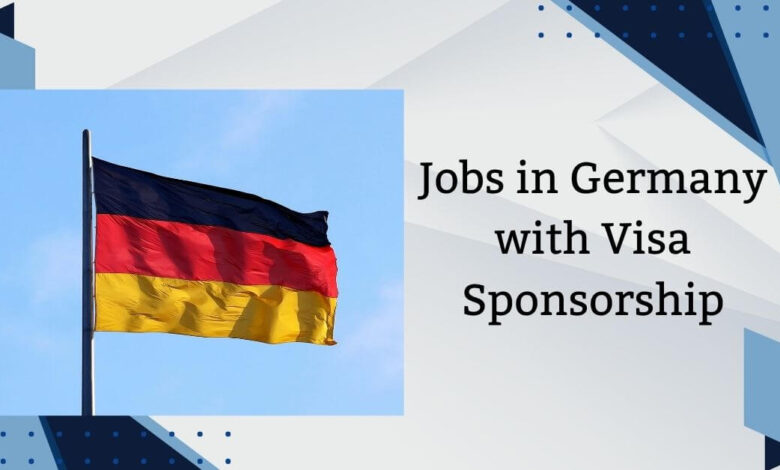Jobs in Germany with Visa Sponsorship 2026 – Apply Now

Jobs in Germany with Visa Sponsorship offer exciting opportunities for skilled professionals and motivated newcomers to live and work in one of Europe’s strongest economies. Salaries vary depending on the role and industry, with entry-level positions starting around €30,000 to €40,000 per year, while experienced professionals in sectors like IT, engineering, healthcare, and finance can earn €50,000 to €80,000+ annually.
Many roles require relevant experience or qualifications, though some employers provide training and onboarding support for international hires. Most positions are on-site and physical, especially in manufacturing, healthcare, and engineering, but remote or hybrid options are increasingly available in IT, digital marketing, and administrative roles.
Whether you’re seeking a full-time career with long-term growth or a contract-based opportunity, jobs in Germany with visa sponsorship provide a valuable pathway to gain international work experience, build professional skills, and enjoy life in a dynamic and welcoming country.
Why Work in Germany?
Germany offers numerous benefits to skilled professionals, including:
- Job Security & Competitive Salaries: Stable employment and attractive salary packages.
- Pathway to Permanent Residency: After working for 33 months (or 21 months with B1 German proficiency), you can apply for permanent residency.
- Relocation Assistance: Many companies cover visa fees, travel expenses, and accommodation support.
- Work-Life Balance: Employees receive 20–30 paid vacation days per year, plus public holidays.
- Access to High-Quality Healthcare: Germany has an excellent universal healthcare system, often subsidized by employers.
- Opportunities for Career Growth: Many industries offer professional development and skill enhancement programs.
- Family Reunification: Some visa sponsorship programs allow you to bring your family.
Types of Work Visas in Germany:
If you are a non-EU national, you must obtain a work visa. The main types include:
1. Skilled Worker Visa:
- Issued for up to four years (can be extended).
- Leads to permanent residency after 21–33 months.
- Requires a job offer from a German employer.
2. EU Blue Card:
- For highly skilled workers with a university degree.
- Requires an annual salary of at least €58,400 (or €45,552 in shortage occupations).
- Easier path to permanent residency (after 21 months with B1 German proficiency).
3. Job Seeker Visa:
- Allows professionals six months to search for a job in Germany.
- Requires proof of sufficient financial means and qualifications.
Eligibility & Requirements:
To apply for a Germany work visa, you must meet the following conditions:
Job Offer from a German Employer: A confirmed job contract is required. Relevant Qualifications – University degree or vocational training recognized in Germany. Work Experience – 1-5 years, depending on the profession. Language Proficiency:
- B1 or B2 German (required for healthcare, public-facing roles).
- English proficiency may be sufficient for IT and multinational companies.
- Health Insurance: Proof of valid German health insurance.
- Sufficient Financial Means: Proof of funds until employment starts.
- Clean Criminal Record: Police clearance certificate from your home country.
- Medical Examination: Some jobs require a health certificate.
Top Companies Sponsoring Work Visas in Germany:
Many German companies are known for hiring international workers and providing visa sponsorship. Here are some of the top employers:
- Siemens (Engineering & Technology)
- BMW & Volkswagen (Automotive)
- BASF & Bayer (Chemical & Pharmaceutical)
- SAP & Deutsche Bank (IT & Finance)
- Allianz & Continental (Insurance & Manufacturing)
- Robert Bosch & Merck (Engineering & Healthcare)
To apply, visit the “Careers” section on their official websites.
How to Apply for Visa Sponsorship Jobs in Germany for Foreigners?
Step 1: Find a Job with Visa Sponsorship:
Search for jobs on official portals such as:
- Make It in Germany – German government’s official job board.
- Bundesagentur für Arbeit – Federal Employment Agency.
- LinkedIn, Indeed, StepStone, Glassdoor – Global job search platforms.
Step 2: Secure a Job Offer:
Once hired, your employer will assist in obtaining your work visa by providing necessary documents such as the job contract and sponsorship letter.
Step 3: Gather Required Documents:
Prepare the following:
- Valid Passport (with at least six months of validity)
- Biometric Photographs
- Signed Employment Contract
- Visa Application Form (from the German embassy website)
- Academic Certificates & Work Experience Proof
- Proof of Health Insurance & Financial Means
Step 4: Apply for the Work Visa:
Submit your application at the German consulate or embassy in your home country. The processing time typically takes 4–12 weeks.
Step 5: Arrive in Germany & Apply for Residence Permit:
Within seven days of arrival, register your residence and apply for a work permit.
List of Jobs in Germany with Visa Sponsorship:
IT Jobs:
IT Jobs in Germany are in high demand as the country continues to expand its technology and digital sectors. Salaries typically range from €45,000 to €80,000 annually, depending on experience and specialization. Employers usually require a degree in computer science, IT certifications, and 2 to 5 years of experience. Responsibilities include software development, network administration, IT support, cybersecurity, and data management. IT jobs in Germany offer international professionals excellent career growth, competitive pay, and opportunities to work in innovative tech environments.
Engineering Jobs:
Engineering Jobs in Germany cover civil, mechanical, electrical, and automotive engineering roles in various industries. Salaries range between €50,000 and €90,000 annually, with higher pay for specialized expertise. Most positions require a recognized engineering degree and 2 to 5 years of professional experience. Responsibilities include project planning, design implementation, technical problem-solving, and site supervision. Germany’s engineering sector provides expatriates with excellent career advancement, high-demand roles, and opportunities to work on cutting-edge projects.
Healthcare Jobs:
Healthcare Jobs in Germany are ideal for doctors, nurses, caregivers, and allied health professionals. Salaries vary from €40,000 to €90,000 per year, depending on qualifications and experience. Employers generally require recognized medical degrees, professional licensing, and relevant work experience. Responsibilities include patient care, clinical support, and administrative duties in hospitals, clinics, or care facilities. Healthcare jobs in Germany offer international professionals competitive pay, professional development, and the chance to work in modern medical facilities.
Skilled Trades Jobs:
Skilled Trades Jobs in Germany include electricians, plumbers, carpenters, welders, and other vocational roles. Salaries range from €30,000 to €55,000 annually, depending on trade and experience. Most employers require vocational training or certifications along with 1 to 3 years of practical experience. Responsibilities include installation, repair, maintenance, and ensuring safety standards are met. Skilled trades jobs in Germany are in high demand, offering stable employment, career growth, and the chance to work in one of Europe’s strongest industrial economies.
Read Also: Seasonal Farm Worker Jobs In Germany Visa Sponsorship For Foreigners
Tracking Your Visa Application:
To check your visa status:
- Visit the German Ministry of Foreign Affairs website.
- Use the German embassy’s online tracking tool in your country.
Conclusion:
Germany is one of the best destinations for skilled foreign workers due to its strong economy, high job demand, and quality of life. By understanding the visa sponsorship process and job market, you can secure a stable and rewarding career in Germany.
Next Steps:
- Update your resume to match German job market standards.
- Apply for jobs through reputable job boards.
- Prepare for the visa process and ensure you meet all requirements.
- Learn basic German (B1 level recommended) to improve your job prospects.
Start Your Job Search Today!
Germany continues to open its doors to skilled professionals worldwide. If you meet the qualifications, this could be the perfect opportunity to advance your career while experiencing life in one of Europe’s most dynamic economies. Apply now and take the first step toward your future in Germany!
Frequently Asked Questions:
What is a skilled worker visa in Germany?
A work visa that allows qualified non-EU nationals to live and work in Germany, often leading to permanent residency.
How long does a skilled worker visa last?
The initial visa is valid for up to four years, with options to extend or transition to permanent residency.
Is learning German necessary?
For healthcare and customer-facing roles, B1 or B2 German is required. For IT and tech jobs, English may be sufficient.




